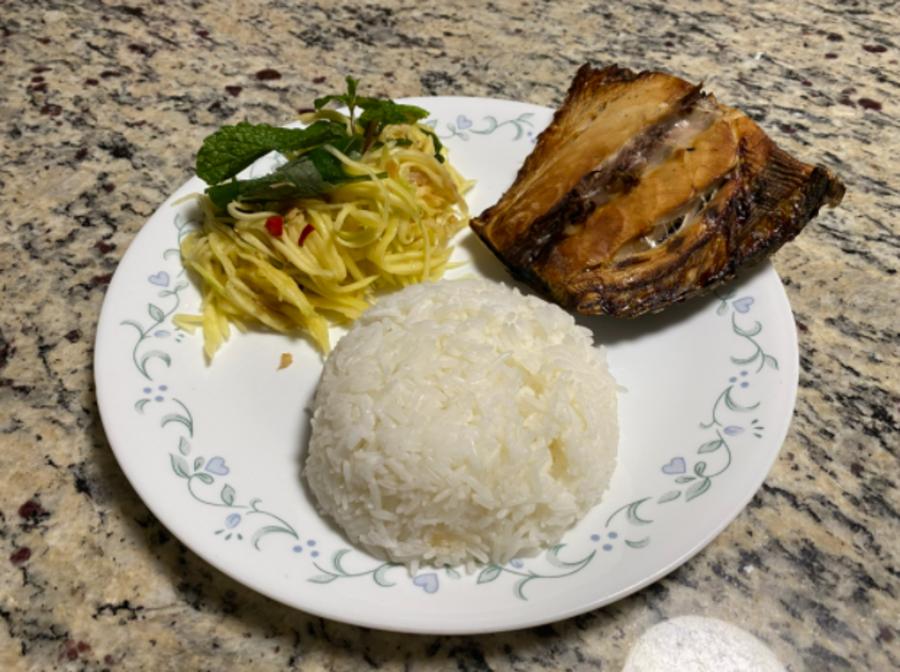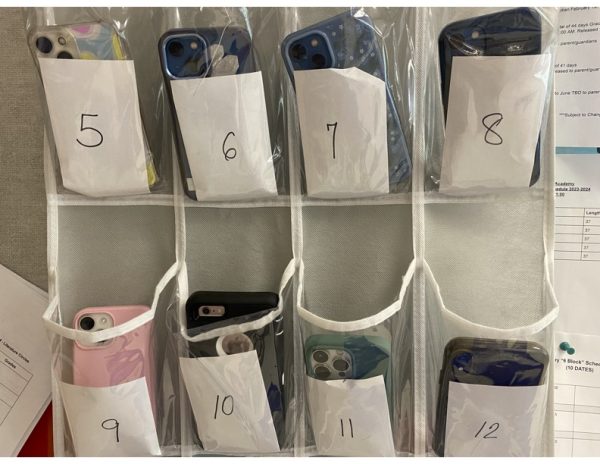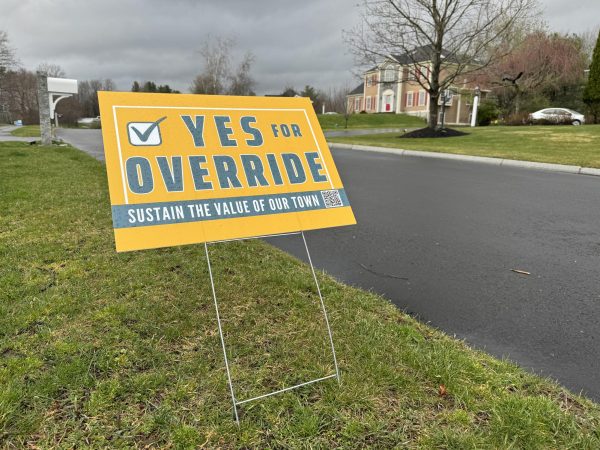My story: Assimilating into Western culture
A common Khmer dish of mango salad with mint (left), white rice (middle), and baked mackerel fish (right).
October 6, 2021
“What is that?” the girl who walked past my table asks as she points to my lunch. I respond, with confusion, and ask her what she had meant. She continues to point at the food in the container and then covers her nose. The scent of my lunch filled the noses of those within a radius of six feet around me in the cafeteria. I soon realized in her other hand, she held a tray with a slice of pizza and chocolate milk that she bought in the lunch line. I look away, avoiding eye contact with the girl, embarrassed of my lunch, I put the lid back on and took out the Lay’s chips my mom packed for me instead — a common American snack.
I tried my best to laugh off the comment while in my head I justified the girl’s actions. I reminded myself, “she didn’t mean it like that”, “the food is pretty stinky”, “she’s right”. Two words that dismissed my anger and laid the blame for the girl’s rude and disrespectful remark on my mom, “she’s right”.
Moving to a predominantly white school was a challenge just as it would be for any other person of color. However, anyone, no matter their race, can experience ill-mannered comments like these based on their culture. Before, I went to school with kids who spoke the same native language, who prayed at the same temple, who shared the same culture as I do. We all had to fit into American culture but we were able to do it with people in the same situation, bringing a level of security and commonality to the group. Our immigrant parents tried their best to maintain their roots by cooking ethnic home-cooked meals and finding a community of fellow Southeast Asian Americans just like us.
Today, I do my best to preserve my own cultural identity as well. I eat Cambodian foods on a daily, go to the temple, and speak Khmer at home. I’ve been doing this since I could ever remember, yet, my first year in Westford was the start of the embarrassment of my culture; after the first day of sixth grade, I stopped bringing my mom’s food for lunch.
At my old elementary school, I’d typically bring leftover food from the dinner I had from the night before. This would consist of white rice, steamed vegetables, and some sort of cooked chicken, fish, and pork. But the other kids who brought their pizza, grilled cheese sandwiches, and PB&Js, are the same kids who will never truly understand what these experiences are like for students of any cultural minority in America. They’ll never understand the feeling of humiliation for something one cannot change because it is part of who they are.
The feeling is quite indescribable actually. The damage the critique had on my perception of not only myself, but my family and heritage affected me for years to come. I began to think that those around me were always right. My self-worth and doubt began to drop. I did my best to assimilate into “Westford” culture. I started eating more Americanized foods, occasionally ditching my mom’s delicious home-cooked meal for pasta and meatballs.
In my old school, I was just like everyone else. Being different isn’t something to be ashamed of, however, surrounding yourself within an environment with people of the same culture and roots adds an extra layer of comfort and security to a community.
Despite all the clichés, I was beginning to feel disconnected from my culture. I was conforming to American norms and I didn’t even realize it. The idea of fitting in with my peers appealed to me like how an iPad appeals to a toddler; so I changed my diet to an extent, my perception of my family, and how I viewed American society. I doubted my own self-worth for the rest of middle school.
So what’s the point of even writing this? Why would I waste my time telling a story that so many kids experience on a daily? Because they experience it on a daily. Keyword: daily. The disrespect kids encounter is highly normalized in American society. Even though the incident was back at the start of middle school, such impertinent comments on different ethnic foods continue to surface in the media like James Corden’s ignorant commentary on common Southeast Asian foods in his gameshow, “Spill Your Guts”.
People need to collectively understand that small comments, whether intentional or not, can be harmful. It’s easy to blame the victim for “overreacting”, but it isn’t easy confronting those who have hurt you. I myself have even struggled with confrontation and as we all know, life moves on, but sometimes, we need to make right of the past.
Adapting to Westford’s culture was something I continue to struggle with even today. I feel as though I’ve transformed into a different person than who I truly am supposed to be. The lunch I brought to school that day is not something to be ashamed of. I shouldn’t be blamed for eating the cultural foods that are part of my heritage, part of who I am. At times I feel ashamed of my roots because I know my peers once perceived me as different. However, as time goes on I hope to move away from the shame I feel from being my true self—an Asian-American.

















